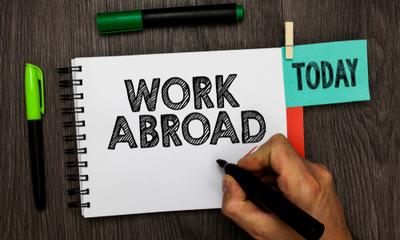How to Move Abroad for Work Without Breaking the Bank?
Moving abroad for work sounds glamorous, doesn’t it? The thought of starting fresh in a new country, exploring different cultures, meeting new people, and earning a better income—it’s exciting. But beneath that excitement comes one uncomfortable question that stops many people in their tracks: How do I afford it?
The truth is, relocating abroad can be expensive if you don’t plan properly. Between visas, flights, accommodation, and other unexpected costs, it’s easy to burn through your savings before you even settle in. But the good news? You don’t need to be rich to work abroad. With the right mindset, strategy, and financial discipline, you can move overseas without draining your wallet.
Relocate to Canada with Us
How to Move Abroad for Work Without Breaking the Bank
Let’s break it down step by step.
1. Start With a Realistic Budget (Not a Dream One)
This is the first step most people skip—and it’s where financial trouble begins. Before you even apply for a job abroad, you need to get brutally honest about money. Research the cost of living in your target country: rent, groceries, transportation, healthcare, and even small things like mobile plans or taxes.
Then, compare that with the average salary for your role in that country. Does the math make sense? Can you live comfortably, save a little, and still have enough left over for emergencies?
Here’s a tip: use websites like Numbeo or Expatistan to check real-time living costs. And don’t forget hidden expenses—visa fees, flight tickets, travel insurance, and initial housing deposits can easily add up.
Creating a simple spreadsheet can help you stay organized. Write down your estimated income, potential expenses, and a small cushion for surprises. Once you have those numbers, you’ll know exactly how much you need to make your move realistic—not just hopeful.
2. Look for Jobs That Offer Relocation Benefits
One of the best-kept secrets about working abroad is that some employers will pay for your move. Many international companies provide relocation packages to attract global talent. These packages often include flight tickets, visa sponsorship, temporary housing, or even cash allowances to help you settle in.
If you’re applying for jobs overseas, pay attention to job descriptions. Look for keywords like “visa sponsorship,” “relocation assistance,” or “expat benefits.” These are signs the employer is willing to invest in your move.
Don’t be afraid to bring it up during interviews either. If you’re a good fit, many employers are open to negotiation. A polite question like, “Does this role offer any relocation support?” can save you thousands.
3. Apply for Work Visa Programs That Don’t Require Huge Fees
Some countries make it easier for foreigners to move and work there by offering simplified visa programs. For example, there are working holiday visas, youth mobility schemes, and skilled worker programs designed for international professionals.
Many of these visas come with affordable application fees or allow you to pay in stages. Do your research on government immigration websites—those are the most reliable sources.
Pro tip: start early. Visa processes can take weeks or even months, and rushing at the last minute often leads to expensive mistakes or extra charges for “urgent processing.”
4. Sell or Simplify Before You Move
Here’s a mistake many people make—they try to move their entire life abroad, literally. Shipping large boxes of furniture, clothes, and gadgets across the ocean can cost a fortune.
Instead, travel light. Sell what you can before you leave. You’ll not only earn some extra cash but also save on shipping costs. Remember, you’re starting a new chapter, and you probably don’t need half of the stuff you currently own.
Carry only essentials—documents, clothes, work tools (like a laptop), and sentimental items. You can buy most other things once you arrive, often cheaper and more suitable for your new environment.
5. Use Temporary Housing First
When you arrive in a new country, resist the urge to rent a long-term apartment right away. It’s tempting to want your own place, but rushing into a lease can lead to bad deals and unnecessary expenses.
Start with short-term options like hostels, shared apartments, or Airbnb stays. Some expats even use Facebook groups or housing forums to find roommates or local sublets at affordable rates. This gives you time to explore neighborhoods and understand which areas are convenient and safe before committing to a long-term contract.
This approach also prevents you from losing money on scams—something that happens to many newcomers who rent online before arriving.
6. Save Smart Before You Go
If your plan to move abroad isn’t immediate, use the time wisely. Set up a savings goal specifically for relocation expenses. You don’t need millions—just enough to cover your flight, visa, and two to three months of basic living costs until you get your first paycheck.
You can do this by cutting unnecessary spending, freelancing on the side, or taking a part-time job. Even small savings add up faster than you think when you’re consistent.
Bonus tip: open a separate bank account just for your “abroad fund.” That way, you won’t be tempted to spend it on everyday things.
7. Tap Into Expat Communities
This is something most people overlook. There are thousands of online communities where expats and international workers share tips, advice, and sometimes even housing or job leads.
Joining these groups can save you from costly mistakes. You’ll find honest insights about living expenses, legal paperwork, and affordable services that outsiders wouldn’t know.
Platforms like Reddit, Facebook, and Internations are full of active members who’ve been in your shoes. Learn from their experience—it’s free, and it’s real-world advice that can save you a lot of stress and money.
8. Learn the Basics of the Local System
When you arrive abroad, it’s easy to get caught up in the excitement and forget about practical details like healthcare, taxes, and transportation. But these small things can quickly turn into financial headaches if you’re not prepared.
Take time to understand how things work in your new country. How do you register for healthcare? What’s the cheapest public transport option? Are there local apps for deals, discounts, or job listings? The faster you adapt, the faster you save.
For instance, locals often know where to find cheaper groceries, discount travel cards, or free community services. Pay attention to those details—they make a big difference in your monthly spending.
9. Build an Emergency Cushion
Even with all the planning in the world, unexpected things can still happen—a delayed job offer, a medical issue, or even a sudden policy change. That’s why having a small emergency fund is non-negotiable.
Ideally, have at least three months’ worth of basic expenses saved up. It’s your safety net while you adjust to your new environment. You’ll sleep better knowing you can handle surprises without going broke.
10. Keep a “Lean” Lifestyle in the Beginning
The first few months abroad are not the time to live lavishly. It’s okay to enjoy new experiences, but do it wisely. Avoid expensive restaurants every night or unnecessary shopping sprees. You’re building a foundation, not going on vacation.
Once your income stabilizes and you understand your expenses, you can loosen up a bit. But in the early stages, think like a smart traveler—live within your means, make conscious choices, and prioritize what truly matters.
Final Thoughts
Moving abroad for work doesn’t have to cost a fortune. It’s not about luck or privilege—it’s about preparation and smart decisions. Plan your finances early, look for employers who support relocation, and learn to adapt to your new environment without over-spending.
The journey won’t always be smooth, but every challenge will teach you something valuable. When you finally settle into your new life, earning your paycheck in a foreign country and building your future step by step, you’ll realize every bit of planning was worth it.
You don’t need to break the bank to start your dream life abroad—you just need to start smart.










